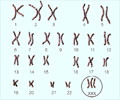Study finds that loss of Y chromosome (LOY) removes protective effect and is associated with an increased risk of development of leukemia and other cancers
- Study finds that UTY gene found on the Y chromosome may have protective effect against leukemia and several other cancers.
- Loss of Y chromosome is associated with increased risk of cancers, in particular acute myeloid leukemia.
- Finding gives deeper insight into how leukemia and other cancers develop and may pave the way for more effective targeted therapies.
Details of Study – Role of UTX and UTY Genes In Cancer Prevention
- The study team analyzed the UTX gene in mice and human cells, to understand how UTX gene mutation or loss led to development of acute myeloid leukemia and other cancers.
- The UTX gene is found on the X chromosome and is a tumor suppressor gene; it acts as a common scaffold, bringing together several regulatory proteins that control DNA replication and gene expression.
- Interestingly, a similar function can also be performed by the UTY gene on the Y chromosome; therefore even when the UTX gene is mutated, the normal UTY gene exerts a cancer protective in male mice.
- However, when both UTX and UTY gene (for example through aging process in males) are lost or mutated, the normal tumor suppressor function is lost making cancers more likely.
Dr Malgorzata Gozdecka, the first author on the study from the Wellcome Sanger Institute, said: "This is the first Y chromosome-specific gene that protects against AML. Previously it had been suggested that the only function of the Y chromosome is in creating male sexual characteristics, but our results indicate that the Y chromosome could also protect against AML and other cancers."
Professor Brian Huntly, joint project leader from Cambridge University and Consultant Haematologist, at Cambridge University Hospitals NHS Trust, said: "It is known that men often lose the Y chromosome from their cells as they age, however the significance of this was unclear. Our study strengthens the argument that loss of the Y chromosome can increase the risk of cancer and describes a mechanism for how this may happen."
About X and Y Chromosomes - In Brief
X and Y are sex chromosomes i.e they determine gender. Females have two X chromosomes whereas males have one X and one Y chromosome. The X and Y chromosomes contain many common genes, but a small number of genes, such as UTY, occur only on the Y chromosome.- Earlier, these Y chromosome specific genes were thought only to have the genetic information required for development male sexual characteristics and were not thought to have other functions until recent research has shown otherwise.
- It has been known that men lose their Y chromosomes as they age, referred to as age related loss of Y chromosome (LOY). However, the actual impact of LOY has remained unclear.
- LOY has been found to be increased with smoking, associated with a shorter survival and higher risk of cancer.
- In fact it is suggested that measuring Y chromosome in blood cells may become a biomarker for predicting male cancer risk.
About Acute Myeloid Leukemia - Aggressive Blood Cancer
Acute myeloid leukaemia is an aggressive form of blood cancer that can occur at any age. In AML the normal precursors of blood cells in the bone marrow are entirely replaced by leukemic cancer cells with resultant anemia, bleeding and recurrent life threatening infections.Standard AML treatments include supportive management and intensive chemotherapy regimens combined and have remained largely unchanged for decades and the overall patient prognosis remains poor.
According to Dr George Vassiliou, joint project leader from the Wellcome Sanger Institute and Consultant Haematologist at Cambridge University Hospitals NHS Trust, "Treatments for AML have not changed in decades and there is a large unmet need for new therapies. This study helps us understand the development of AML and gives us clues for developing new drug targets to disrupt leukaemia-causing processes. We hope this study will enable new lines of research for the development of previously unforeseen treatments and improve the lives of patients with AML."
Dr Alasdair Rankin, Director of Research at Bloodwise, said: "Survival rates for AML remain tragically low, with current treatment that involves intensive chemotherapy, often combined with a stem cell transplant, only curing a small proportion of patients". This important research helps build a fuller picture of what goes wrong genetically as this highly aggressive leukaemia develops.
Scope of Study
Thus, the findings of the study have uncovered hitherto unknown role of the Y chromosome specific genes such as the UTY gene. This knowledge may throw light on the mechanisms of cancer formation and pave the way for future research and development of targeted therapies that might be more effective and improve the outcome for these patients.References:
- Malgorzata Gozdecka, Eshwar Meduri, Brian J. P. Huntly. "UTX-mediated enhancer and chromatin remodelingsuppresses myeloid leukemogenesis through noncatalytic inverse regulation of ETS and GATA programs", Nature Genetics (2018) DOI:10.1038/s41588-018-0114-z
- Predrag Noveski, Svetlana Madjunkova, Emilija Sukarova Stefanovska,Nadica Matevska Geshkovska, Maja Kuzmanovska, Aleksandar Dimovski, Dijana Plaseska-Karanfilska1,. "Loss of Y Chromosome in PeripheralBlood of Colorectal and Prostate Cancer Patients", PLOS one (2016) DOI: 10.1371/journal.pone.0146264
Source-Medindia















